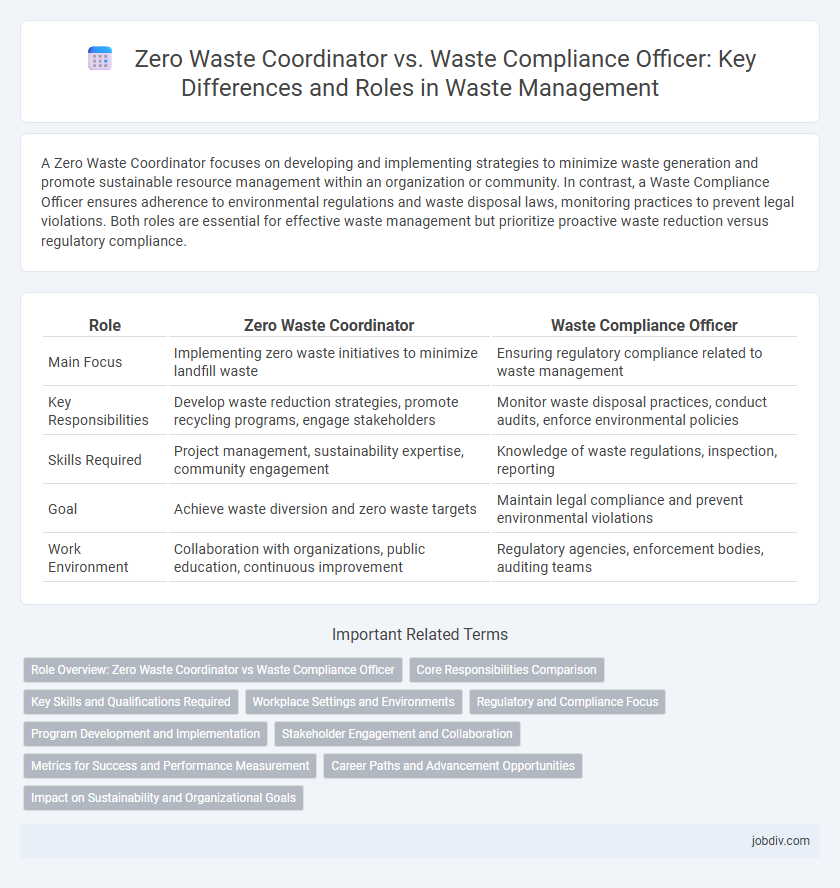A Zero Waste Coordinator focuses on developing and implementing strategies to minimize waste generation and promote sustainable resource management within an organization or community. In contrast, a Waste Compliance Officer ensures adherence to environmental regulations and waste disposal laws, monitoring practices to prevent legal violations. Both roles are essential for effective waste management but prioritize proactive waste reduction versus regulatory compliance.
Table of Comparison
| Role | Zero Waste Coordinator | Waste Compliance Officer |
|---|---|---|
| Main Focus | Implementing zero waste initiatives to minimize landfill waste | Ensuring regulatory compliance related to waste management |
| Key Responsibilities | Develop waste reduction strategies, promote recycling programs, engage stakeholders | Monitor waste disposal practices, conduct audits, enforce environmental policies |
| Skills Required | Project management, sustainability expertise, community engagement | Knowledge of waste regulations, inspection, reporting |
| Goal | Achieve waste diversion and zero waste targets | Maintain legal compliance and prevent environmental violations |
| Work Environment | Collaboration with organizations, public education, continuous improvement | Regulatory agencies, enforcement bodies, auditing teams |
Role Overview: Zero Waste Coordinator vs Waste Compliance Officer
Zero Waste Coordinators develop and implement strategies to minimize waste generation and promote sustainable resource use within organizations, focusing on waste reduction, reuse, and recycling initiatives. Waste Compliance Officers ensure adherence to environmental regulations and waste management laws by monitoring, auditing, and reporting on waste disposal practices to prevent legal violations and environmental harm. Both roles are integral to effective waste management but differ as the coordinator drives proactive waste reduction programs, while the compliance officer enforces regulatory standards.
Core Responsibilities Comparison
A Zero Waste Coordinator primarily develops and implements strategies to minimize waste generation through recycling, composting, and sustainability programs, aiming to achieve zero waste goals. In contrast, a Waste Compliance Officer ensures adherence to environmental regulations and policies by monitoring waste disposal practices, conducting audits, and managing reporting requirements. Both roles require expertise in waste management, but the Zero Waste Coordinator focuses on proactive waste reduction, while the Waste Compliance Officer emphasizes regulatory compliance and risk mitigation.
Key Skills and Qualifications Required
Zero Waste Coordinators require expertise in sustainable waste management practices, project coordination, and stakeholder engagement, alongside strong knowledge of environmental policies and circular economy principles. Waste Compliance Officers must possess in-depth understanding of regulatory frameworks, auditing skills, and the ability to enforce waste disposal laws, with qualifications including certifications in environmental compliance and risk management. Both roles benefit from strong analytical abilities, communication skills, and proficiency in data reporting related to waste reduction and regulatory adherence.
Workplace Settings and Environments
Zero Waste Coordinators in workplace settings drive sustainability initiatives by implementing waste reduction programs and promoting circular economy practices. Waste Compliance Officers focus on ensuring adherence to environmental regulations and company policies, conducting audits and managing hazardous waste protocols. Both roles collaborate to maintain compliant, eco-friendly workplace environments through strategic waste management and regulatory oversight.
Regulatory and Compliance Focus
A Zero Waste Coordinator primarily drives initiatives to minimize waste generation and promotes sustainable practices through community engagement and internal policy development. In contrast, a Waste Compliance Officer ensures adherence to environmental regulations, conducts audits, and manages reporting for hazardous and non-hazardous waste disposal. Both roles play essential parts in regulatory frameworks, with the Coordinator focusing on waste reduction strategies and the Officer emphasizing compliance with legal standards and permits.
Program Development and Implementation
Zero Waste Coordinators specialize in developing and implementing sustainable waste reduction programs aimed at minimizing landfill use and promoting recycling initiatives. Waste Compliance Officers focus on ensuring adherence to environmental regulations and waste management policies through monitoring and reporting activities. Both roles are essential for effective waste management, with coordinators driving program innovation and officers maintaining regulatory compliance.
Stakeholder Engagement and Collaboration
A Zero Waste Coordinator drives stakeholder engagement by fostering partnerships with businesses, community groups, and government agencies to implement sustainable waste reduction initiatives. Waste Compliance Officers focus on collaboration by ensuring adherence to regulatory requirements and coordinating with stakeholders to address waste management violations effectively. Both roles require strategic communication and teamwork, but the Zero Waste Coordinator prioritizes proactive engagement, while the Compliance Officer emphasizes regulatory compliance.
Metrics for Success and Performance Measurement
Zero Waste Coordinators measure success by tracking waste diversion rates, reduction in landfill usage, and implementation of circular economy initiatives, emphasizing resource recovery and community engagement. Waste Compliance Officers focus on adherence to environmental regulations, timely reporting, and reduction of violations or fines, ensuring organizational compliance with waste management laws. Performance measurement for both roles includes data accuracy, efficiency in waste audits, and continuous improvement in waste handling processes.
Career Paths and Advancement Opportunities
Zero Waste Coordinators focus on designing and implementing waste reduction programs, advancing through roles like sustainability managers or environmental consultants by gaining expertise in waste minimization strategies. Waste Compliance Officers specialize in regulatory adherence and environmental law enforcement, progressing toward senior compliance roles or environmental auditing by developing deep knowledge of legal standards and inspection protocols. Career advancement in both paths depends on certifications such as LEED or Certified Environmental Professional (CEP) and experience in regulatory frameworks or sustainability initiatives.
Impact on Sustainability and Organizational Goals
A Zero Waste Coordinator drives sustainability by implementing waste reduction strategies, promoting recycling initiatives, and achieving circular economy goals that minimize landfill impact. A Waste Compliance Officer ensures adherence to environmental regulations, mitigating legal risks and maintaining organizational credibility. Together, they balance proactive sustainability efforts with regulatory compliance to advance long-term environmental and organizational objectives.
Zero Waste Coordinator vs Waste Compliance Officer Infographic

 jobdiv.com
jobdiv.com